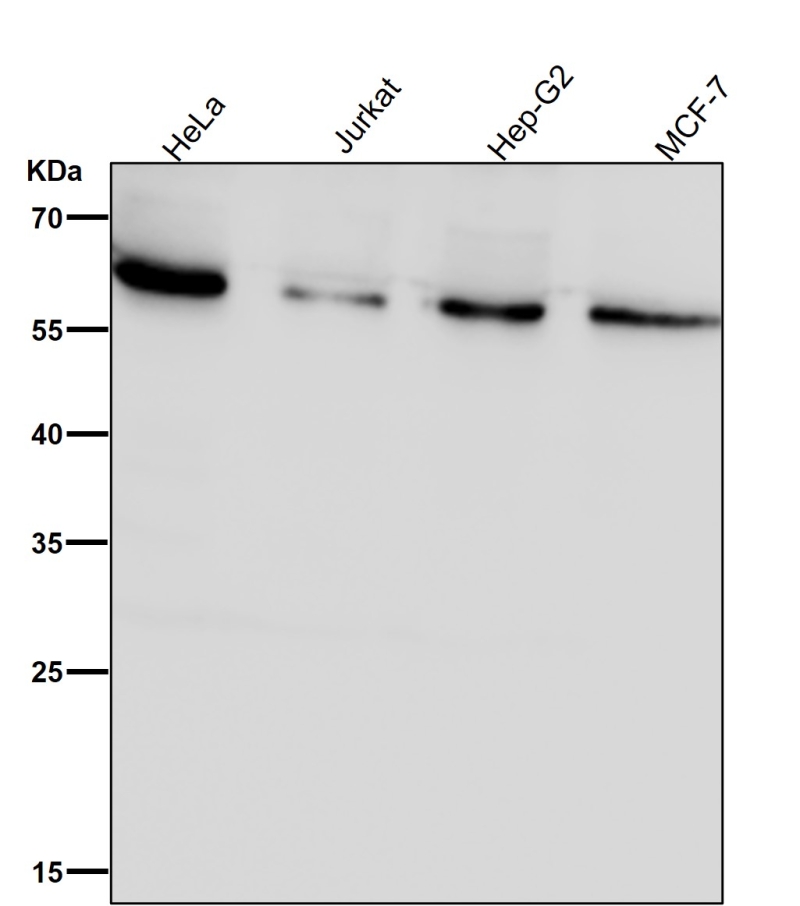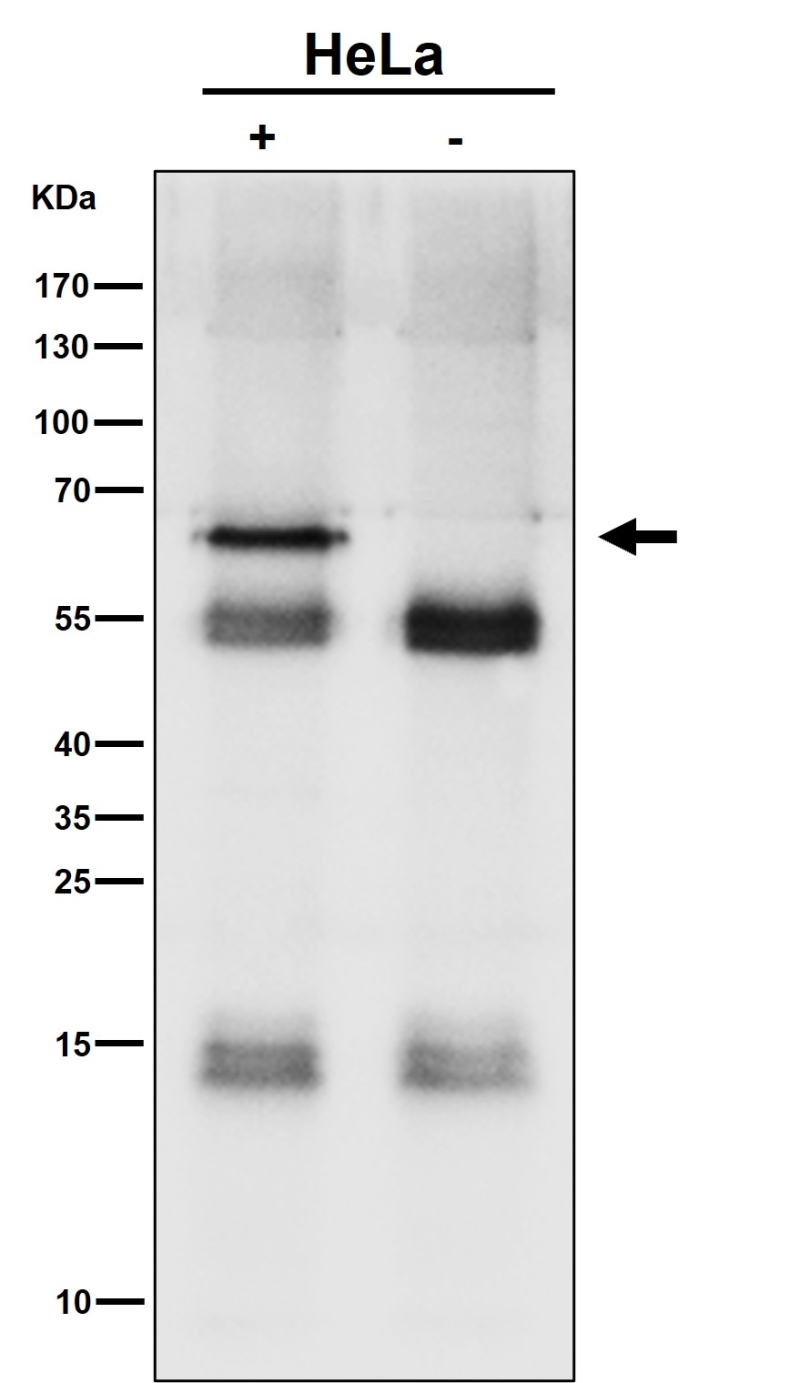

| WB | 咨询技术 | Human,Mouse,Rat |
| IF | 1/20-1/50 | Human,Mouse,Rat |
| IHC | 咨询技术 | Human,Mouse,Rat |
| ICC | 1/50-1/200 | Human,Mouse,Rat |
| FCM | 1/20-1/100 | Human,Mouse,Rat |
| Elisa | 咨询技术 | Human,Mouse,Rat |
| Aliases | DER3; E3 ubiquitin-protein ligase synoviolin; HRD1; Synovial apoptosis inhibitor 1; Synoviolin 1; Synoviolin 1 isoform b; SYNOVIOLIN; SYVN1;;SYVN1 |
| WB Predicted band size | Calculated MW: 68 kDa ; Observed MW: 65 kDa |
| Host/Isotype | Rabbit IgG |
| Antibody Type | Primary antibody |
| Storage | Store at 4°C short term. Aliquot and store at -20°C long term. Avoid freeze/thaw cycles. |
| Species Reactivity | Human,Mouse,Rat |
| Immunogen | A synthesized peptide derived from human SYVN1 |
| Formulation | Purified antibody in PBS with 0.05% sodium azide,0.05% BSA and 50% glycerol. |
+ +
以下是关于SYVN1/HRD1抗体的3篇代表性文献摘要示例(注:文献为示例性质,具体引用需查阅实际数据库):
---
1. **文献名称**:*SYVN1 ubiquitinates the IRE1α kinase to regulate adaptive responses to ER stress*
**作者**:Yang H, et al.
**摘要**:本研究利用SYVN1抗体验证了其在内质网应激中与IRE1α的相互作用,发现SYVN1通过泛素化修饰调控IRE1α的稳定性,影响未折叠蛋白反应(UPR)通路,为神经退行性疾病机制提供了新见解。
---
2. **文献名称**:*HRD1-mediated degradation of the amyloid precursor protein prevents neurotoxicity in Alzheimer’s disease models*
**作者**:Kaneko M, et al.
**摘要**:通过HRD1抗体的免疫共沉淀实验,作者发现HRD1通过泛素-蛋白酶体系统降解淀粉样蛋白前体(APP),减少β-淀粉样蛋白(Aβ)沉积,提示HRD1可能是阿尔茨海默病的潜在治疗靶点。
---
3. **文献名称**:*HRD1 promotes tumor progression by modulating PD-L1 stability in colorectal cancer*
**作者**:Sun Y, et al.
**摘要**:研究使用HRD1抗体进行Western blot和免疫组化分析,证实HRD1通过降解PD-L1蛋白增强肿瘤免疫逃逸,靶向HRD1可提高抗PD-1疗法的敏感性。
---
如需具体文献,建议通过PubMed或Google Scholar检索关键词“SYVN1 antibody”或“HRD1 function”,并筛选涉及抗体应用的实验研究(如Western blot、IP等)。
SYVN1 (Synoviolin), also known as HRD1 (HMG-CoA reductase degradation protein 1), is an E3 ubiquitin ligase central to the endoplasmic reticulum-associated degradation (ERAD) pathway. It plays a critical role in maintaining proteostasis by targeting misfolded or unassembled proteins in the ER for ubiquitination and subsequent proteasomal degradation. Dysregulation of SYVN1/HRD1 has been linked to various diseases, including neurodegenerative disorders (e.g., Alzheimer’s and Parkinson’s), cancer, and autoimmune conditions, due to its involvement in protein quality control and stress response pathways.
Antibodies targeting SYVN1/HRD1 are essential tools for studying its expression, localization, and function. These antibodies are widely used in techniques such as Western blotting, immunoprecipitation, and immunofluorescence to investigate SYVN1/HRD1’s interaction with substrates (e.g., amyloid precursor protein or tau) and its regulatory mechanisms. Specific antibodies often recognize conserved epitopes across species, facilitating cross-species research. Validation typically includes knockout cell lines or siRNA-mediated silencing to confirm specificity.
Research using SYVN1/HRD1 antibodies has revealed its dual roles in disease contexts: while it can promote cancer cell survival by degrading tumor suppressors, it also mitigates neurodegeneration by clearing toxic protein aggregates. Its interplay with ER stress sensors like IRE1α further highlights its importance in the unfolded protein response (UPR). Reliable antibodies are thus vital for advancing therapeutic strategies targeting ERAD pathways.
×